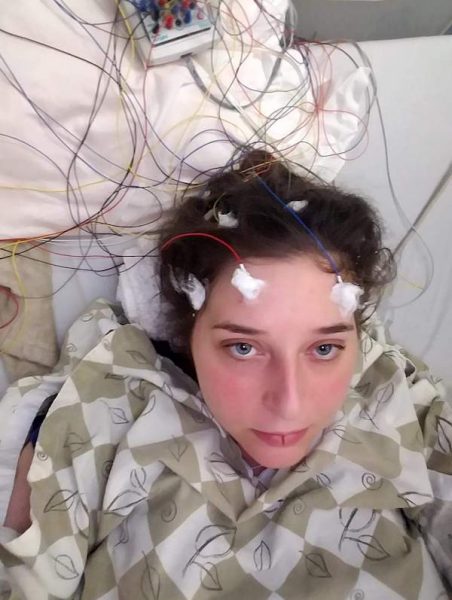In 2014, I wrote a blog post about Crystal Goodwin, whose life had turned upside down three years before when she was diagnosed with a rare disorder called mast cell activation syndrome (MCAS). Mast cells are a type of white blood cell found in the immune system. They contain histamine, which helps fight infection, but if too much is released or released inappropriately, it can wreak havoc.
When someone has a mast cell condition like Crystal’s, suddenly their mast cells just explosively release chemicals — out of the blue, sporadically and unpredictably.
Dr. Marguerite Pennoyer, allergist (now retired)
That’s what happened to Crystal. Out of the blue, she had severe intestinal problems — pain, inflammation and bleeding. Soon after, about every three weeks, sometimes, twice in one week, she had anaphylaxis, which is a severe, potentially life-threatening allergic reaction. When it happens, the immune system releases a flood of chemicals. The blood pressure drops suddenly and the airways narrow, making it hard to breathe.
Because everything she encountered was potentially an allergen that could end her life, Crystal became practically housebound and dependent on many, many medications. Venturing out meant needing to know the environment as well as she could, wearing a mask, always being aware of any reactions or symptoms, and making sure she had her EpiPen.
Since her diagnosis, she has experienced a lot of downs and some meaningful ups. Let me start on the upside. She met and married a wonderful man by the name of Stanley Phanor. Yes, her allergies presented a problem and yes, he knew what he was signing up for. When things got serious, she put him to the test.
Either you’re in it for the long haul or you’re not. It was not a decision he could take lightly. It was a big decision. It took him a little while to decide, but finally, he said, I’m jumping in with both feet. And he’s still here. March will be eight years.
Crystal Goodwin
But love didn’t suddenly make everything better. Crystal started having fainting spells. At one point, she couldn’t sit up without fainting. At least once a month she lands in the hospital because of fainting or non-stop vomiting. Her heart rate increases and her blood pressure either soars or plummets.
The cause is dysautonomia, a disorder of the autonomic nervous system, which controls, among other things, the heartbeat. One of the treatments is beta-blockers, which Crystal can’t take because she is allergic to them. Doctors are trying other medications, but in the meantime, once again, she has to be on high alert.
There are different types of dysautonomia — the one Crystal has is called postural orthostatic tachycardia syndrome (POTS). It affects the blood flow throughout the body and can either make you dizzy when you stand up or cause you to faint.
If two serious conditions aren’t enough, it turns out Crystal also has a connective tissue disorder called hypermobile Ehlers-Danlos syndrome (hEDS)
When I go back to my childhood I used to have all these weird things I could do with my joints and the way I could bend my arms backward. I was double-jointed and they would easily dislocate. My shoulders, hips, and ankles dislocate. I never knew that this is what I have.
Crystal
MCAS, POTS, and EDS. A trifecta. There hasn’t been enough research to solidify the connection but there certainly does seem to be one. In a 2015 pilot study published in the Journal of Allergy and Clinical Immunology scientists referred to the three disorders as “a new disease cluster.” Crystal’s doctors believe her allergies brought on the POTS, which made them think about the hEDS.
It’s a lot to take in, but let’s get back to the upside of Crystal’s story. Last December, she and her husband welcomed baby Gisele into their family.
It was a high-risk pregnancy that required close monitoring of both Crystal and the baby. The most concerning risk to the baby was the medications Crystal was taking for Mast Cell.

It was like a Catch 22. If I stopped them, my health was at risk, but if I continued them the baby’s health was possibly at risk. It was really hard. I had a meeting with a few different pharmacists and my doctor talked to a couple of pediatric specialists. It was definitely challenging. I did end up stopping a medication for migraines and experienced quite a few migraines. But I had to stay on other medications such as heart and blood pressure mediation and prednisone.
Crystal
She had a C-section because her doctors thought it would be too risky for her to go through labor. After Gisele was born, breastfeeding was out of the question because of Crystal’s medications. She said It was hard for her, but she didn’t have a choice.
In addition to the birth of Gisele, something else that was also miraculous happened. Crystal’s allergies calmed down. She’s been in remission ever since and her doctors says it could last a year or two.
I’m excited that things have gotten better with the mast cell disease. I’m still dealing with little symptoms, but I haven’t had — I should knock on wood — a major anaphylactic event for over a year now, which is a record for me because I was going to the ER at least once a month.
Crystal
She still has to take medications and she is still dealing with POTS and being rushed to the hospital at a moment’s notice. How on earth can she also manage being a mother? She gets a lot of help and support from her husband, her mother and sister, and a good friend.
I definitely could never do it on my own. There’s no way. We say to each other all the time that we never could have done this without help from our family and friends.
Crystal
With all she has to deal with, Crystal still manages to have a positive attitude.
I think having my daughter has definitely helped me continue going on, especially with an increase in the dysautonomia. I just don’t feel good, my body just hurts, everything hurts, but when I see her smiling and laughing and think of the future and what she’s going to bring to our lives, that helps me keep going.
Crystal
There is something else that should help Crystal keep going. A service dog. One that will be trained to alert her when her heart rate starts getting high or her blood pressure is changing — and to sense that she might be fainting even before she feels anything. An alert from a trained service dog won’t prevent her from fainting but could give her control over how she falls or where she lands.

The dog could also be trained to detect any allergens that might cause a severe reaction. That’s what Martina Baker’s dog Keeva was trained to do. Like Crystal, Martina also has mast cell activation syndrome. I wrote a blog post about her a few years ago, which you can read here: Keeva, a service dog for Martina.
Because of Keeva, Martina’s hospitalizations have reduced significantly, says her mother Loretta Morse Leighton.
She was up to two to three times a week going to the ER from anaphylaxis. Her anaphylactic reactions are greatly reduced because Keeva alerts her to rising histamine levels before Martina even knows she is having a problem. When this happens, Martina then takes her emergency meds. The times we haven’t trusted that Keeva is right (Martina thinking she is fine and not reacting), within a half-hour she starts to get the familiar feeling … scratchy throat, itchy skin, hives, flushing, and anaphylaxis which means EPI and a trip to ER. We now say “Keeva is ALWAYS right.”
Loretta Morse Leighton, Martina’s mother
Like Crystal, Martina suddenly began having unusual allergic reactions. She woke up one morning covered with hives. After eight months of trying to get answers, Loretta was doing an online search of her daughter’s symptoms and discovered the blog post I wrote about Crystal. Her story and symptoms paralleled Martina’s, so Loretta reached out to her.
She was instrumental in getting us to Boston where Martina’s illness was finally diagnosed. I cannot tell you how many times we have called her in the middle of the night while at the ER when we need support and advice. She is amazing. She has helped so many in the MCAS world.
Loretta
And now Loretta is trying to help Crystal, who after seeing what Keeva has done for Martina, realized that a service dog could help her, too. The dog will be purchased and trained by Jamie Robinson, who not only trained Keeva but also delivered her in person and stayed with the family to help them get used to each other.
After an exhaustive search and screening of potential dogs, Jamie found a suitable candidate for Crystal — a golden doodle named Demi. She gave the breeder a deposit and has until December to get the remaining funds.
It costs $20,000 to purchase a dog and do highly specialized training. To help raise the money for Crystal’s dog, Loretta has set up a GoFundMe page. If you’d like to make a donation and help get a service dog for Crystal, here is the link to the GoFundMe page.
Here’s one last cute picture. Puppies and babies. Who can resist?








Leave A Comment